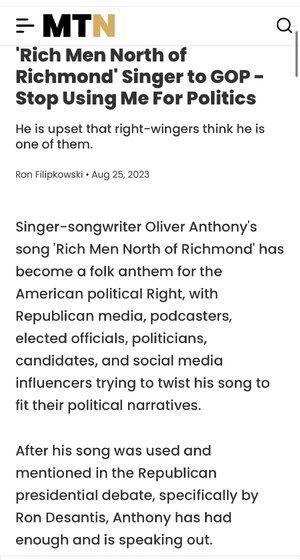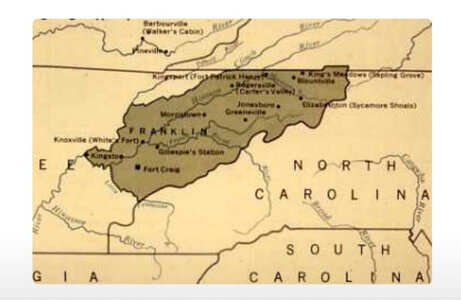Navigation
Install the app
How to install the app on iOS
Follow along with the video below to see how to install our site as a web app on your home screen.
Note: This feature may not be available in some browsers.
More options
You are using an out of date browser. It may not display this or other websites correctly.
You should upgrade or use an alternative browser.
You should upgrade or use an alternative browser.
"Year w/out a Summer" & "Rich Men North of a Million:" This Date in History
- Thread starter donbosco
- Start date
- Replies: 1K
- Views: 115K
- Off-Topic
donbosco
Inconceivable Member
- Messages
- 4,129

#OTD in 1816 a Heavy Frost covered N.C. & The South-‘The Year W/O a Summer’ was caused by the Eruption of Indonesia’s Mt.Tambora in April of 1815. Volcanic dust caused drought, low temps, and other strange & devastating weather around the world for months. North Carolina’s “Year Without a Summer,” 1816
Image is from the ‘Raleigh Minerva’ of September 27, 1816.
superrific
Legend of ZZL
- Messages
- 9,516
Two years ago Billy Bragg released this song...not exactly a response to Oliver Anthony's "Rich Men North of Richmond" but more of a clarifying of the message...of course that is my opinion.
I don't understand. Bragg specifically said that it was a response, and obviously the lyrics are structured like a discourse with Anthony.
donbosco
Inconceivable Member
- Messages
- 4,129
I don't understand. Bragg specifically said that it was a response, and obviously the lyrics are structured like a discourse with Anthony.
I gave my opinion of it.
superrific
Legend of ZZL
- Messages
- 9,516
But what do you mean it wasn't a response? I like the song a lot. I'm just not understanding what you mean when you say it's a clarification.I gave my opinion of it.
superrific
Legend of ZZL
- Messages
- 9,516
I see. OK, I think that's what Bragg said he was doing. I'm not sure if Bragg was being fully honest -- he's been around the block long enough to sniff out the BS -- but yes, I agree that was the primary intent.I don’t believe that Bragg was ‘calling out’ Anthony but rather wanted to leave him room to reinterpret his ways of seeing. He’d make a better ally than enemy after all.
superrific
Legend of ZZL
- Messages
- 9,516
I agree, but there's this last lyric:I genuinely think Bragg sees Anthony as a worker.
Well, they wanna divide us because together we're strong
Are you gonna take action now you sung your damn song?
If you don't like the rich men having total control
You better get the union to roll
"Damn song" suggests to me that Bragg expects a negative answer to that rhetorical question. And while I have not followed the career of Oliver Anthony, having heard nothing about him for a while suggests to me that he has not turned to union support.
donbosco
Inconceivable Member
- Messages
- 4,129
I agree, but there's this last lyric:
Well, they wanna divide us because together we're strong
Are you gonna take action now you sung your damn song?
If you don't like the rich men having total control
You better get the union to roll
"Damn song" suggests to me that Bragg expects a negative answer to that rhetorical question. And while I have not followed the career of Oliver Anthony, having heard nothing about him for a while suggests to me that he has not turned to union support.
Bragg has been at it for decades...he knows his is the Lucha Prolongada.
There use to be a show that came on during the summer a couple of years in the “60’s. On one show they had a skit making fun of the literacy tests. The skit was set at a voting station in Mississippi. The man giving the tests asked a white man to count to 10. The next person in line is a black man. The man asked him what the Theory of Relativity meant. The black man replied, “It means I can’t vote.”#OnThisDay in 1920, the Nineteenth Amendment to the U.S. Constitution was ratified, granting women the legal right to #vote.
But the story didn’t end there. For many Black women, systemic barriers like poll taxes, literacy tests, and intimidation kept them from the ballot box. Ida B. Wells-Barnett and others formed the Alpha Suffrage Club in 1913 to fight for voting rights that went beyond the text of the amendment.
Read more in this JSTOR Daily article from 2020: https://bit.ly/4oFkxJR
donbosco
Inconceivable Member
- Messages
- 4,129


'Rich Men North of Richmond' Singer to GOP - Stop Using Me For Politics - MeidasTouch News
He is upset that right-wingers think he is one of them.
donbosco
Inconceivable Member
- Messages
- 4,129
#OTD in 1784 Franklin declared INDP from NC. Led by John Sevier the western settlers wrote a Constitution & elected a Legislature. The Federal Govt. did not recognize the secession & Franklin languished but Sevier was elected the US House from NC in 1789. That same year those lands were ceded by NC to Federal Government & in 1796 TN created. Franklin was basically ignored into oblivion.
https://www.ncdcr.gov/blog/2016/08/23/lost-state-franklin
https://www.ncdcr.gov/blog/2016/08/23/lost-state-franklin
Last edited:
donbosco
Inconceivable Member
- Messages
- 4,129
For being basically uninhabited, those few that were in the Western Hemisphere must have had some mad/mythical/extraterrestial building skills.
On the serious side, my understanding of history was irrevocably changed/influenced by Alfred S. Crosby's trilogy: The Columbian Exchange (1972), Ecological Imperialism (1986), and The Measure of Reality (1997). I love the quote about Crosby that went something like, "The Columbian Exchange blasted a crater in the anthropology of the Americas that we as an academic discipline still haven't crawled out of." Also, I loved the books Charles C. Mann wrote: 1491 (2005) and 1493 (2011), about pre-Columbian America and the post-Columbian world.
I loved the story that Mann told about his interview of Crosby for a newspaper article where he asked whether Crosby would write a book that focused on what Mann later covered in "1491." And supposedly Crosby told Mann that he (Crosby) was too old to undertake that task and challenged Mann to write that book.
Two last notes: 1) I absolutely and categorically reject what I consider to be the absurd notion that anyone other than Native Americans were responsible for the magnificent and monumental buildings and cities of the pre-Columbian Americans. It wasn't extra-terrestrials. It wasn't the Egyptians. It wasn't the Chinese. It wasn't the Romans. It wasn't the Polynesians. It wasn't the Vikings. And it wasn't Irish monks. It was the Native Americans. 2) I really hope I live long enough to get some sort of realistic appraisal of the Pre-Columbian societies that existed in the basin of the Amazon River. But I doubt I will. The technology to really do that is just too far in the future.
I was looking for this and finally encountered it. A short version of Charles C. Mann's 1491.
Charles C. Mann, 1491
- Messages
- 1,468
That's not a short version of "1491." That's a 2002 magazine article in "The Atlantic" that was so well received that Charles Mann expanded it into a full-length book, published in 2005. I know I am quibbling over terminology, but I do not consider a magazine article that inspired a book to be a summary of that book. In 2002, I was a subscriber to "The Atlantic" and had already read "The Columbian Exchange." So, you can only imagine, that with my eyes previously opened by "The Columbian Exchange," how eagerly I tore through Mann's article. I made something of a nuisance of myself at a family gathering a week or two after I received the March 2002 issue of "The Atlantic" by insisting to some of my relatives that they need to sit down and immediately read the article. I've been an a** h*** for a long time.I was looking for this and finally encountered it. A short version of Charles C. Mann's 1491.
Charles C. Mann, 1491
cogweb.ucla.edu
donbosco
Inconceivable Member
- Messages
- 4,129
That's not a short version of "1491." That's a 2002 magazine article in "The Atlantic" that was so well received that Charles Mann expanded it into a full-length book, published in 2005. I know I am quibbling over terminology, but I do not consider a magazine article that inspired a book to be a summary of that book. In 2002, I was a subscriber to "The Atlantic" and had already read "The Columbian Exchange." So, you can only imagine, that with my eyes previously opened by "The Columbian Exchange," how eagerly I tore through Mann's article. I made something of a nuisance of myself at a family gathering a week or two after I received the March 2002 issue of "The Atlantic" by insisting to some of my relatives that they need to sit down and immediately read the article. I've been an a** h*** for a long time.
Alas you are correct. I did "let my hair down" for a moment. My apologies.
Share:

